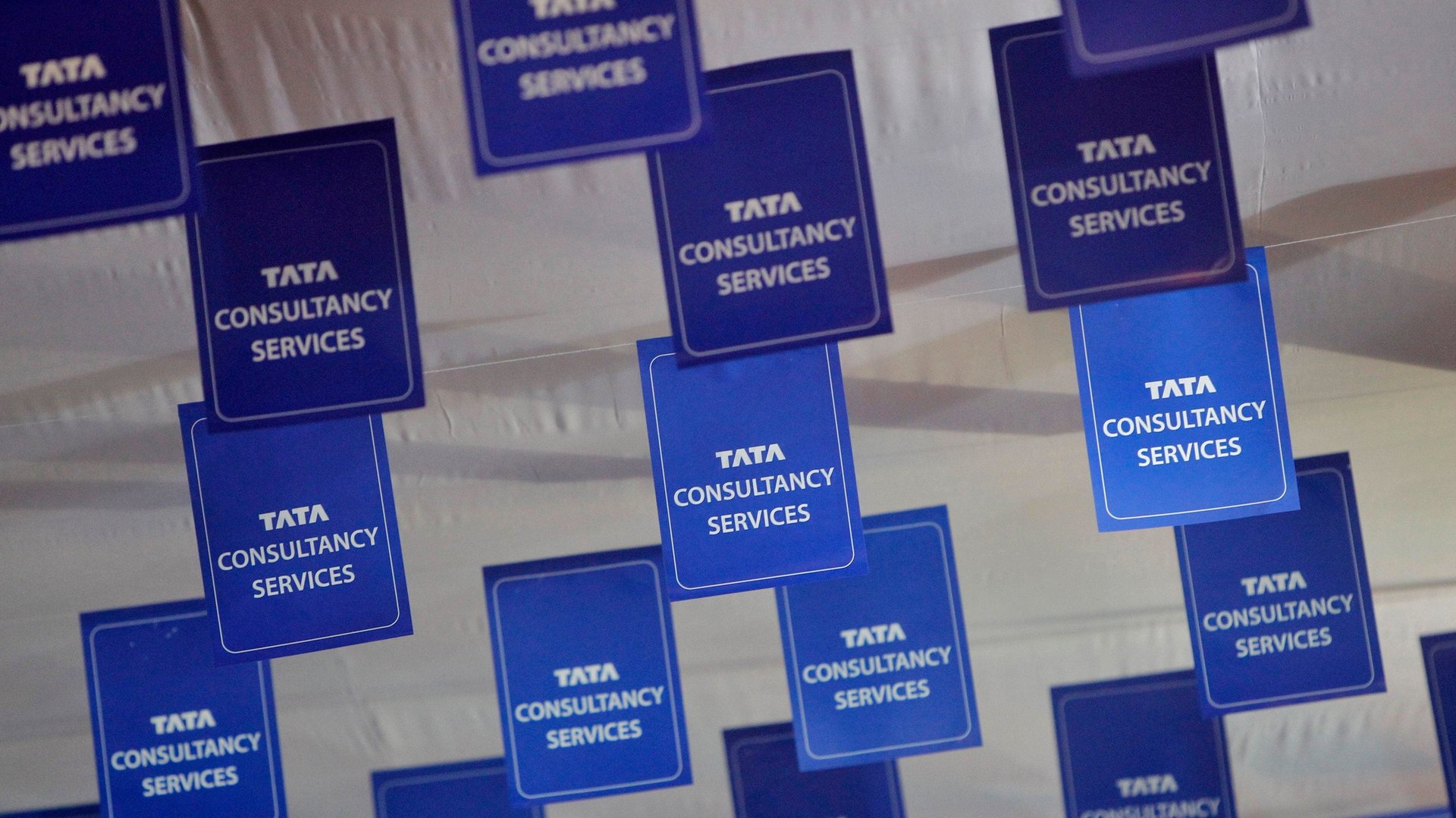Why TCS is worth $100 billion, and Infosys isn’t
Tata Consultancy Services (TCS), India’s largest IT services company, is now one of the world’s 100 most valuable firms by market valuation.


Tata Consultancy Services (TCS), India’s largest IT services company, is now one of the world’s 100 most valuable firms by market valuation.
The market capitalisation of Mumbai-based TCS today (April 23) crossed $100 billion (Rs6,65,275 crore), making it the first Indian company in a decade to reach this milestone. In 2008, Mukesh Ambani-owned Reliance Industries had breached the threshold, according to Bloomberg.
Now, TCS’s market cap is almost 2.5 times more than its nearest Indian competitor, Infosys.
On April 20, TCS shares ended nearly 7% higher, taking the company’s market cap to over $98 billion. The spike in share price was in reaction to better-than-expected earnings for the January-March 2018 quarter (Q4) announced on April 19. The company’s fourth-quarter net profit rose (pdf) 5.7% to Rs6,904 crore, while revenue increased 3.8% to Rs32,075 crore. In addition, it announced a 1:1 bonus share issue, lifting investors’ sentiments.
But TCS’s stronger performance is not a recent phenomenon. Its shares have gained over 25% since January, compared to the around 14% rise for its nearest Indian rival Infosys.
“If you had spoken to someone (in 2016) about the milestone achieved by TCS today, people would have possibly laughed,” Gaurang Shah, head investment strategist at financial services firm Geojit BNP Paribas, told Quartz. “(But) the stock has a given a 65% return from the lows of 2016.”
There is a perception that TCS has outperformed Infosys because of its greater focus on new technologies like digital, but analysts believe there’s more to it. “It would be wrong to say that TCS has done something vis-a-vis technology that Infosys has not,” said Sanchit Gogia, chief analyst and CEO of Greyhound Research. “It’s just that TCS has a much bigger scale at which it is implementing these things.”
Nonetheless, while all software exporters from India struggled amid changing client requirements and protectionist policies in the US, one thing set TCS apart: leadership.
The consistency in leadership and smooth transitions between CEOs are among the reasons why it has overtaken Infosys, considered the IT sector bellwether until a couple of years ago.
“Both the companies, TCS and Infosys, have seen leadership changes but the results show that TCS is a little bit ahead of the curve and has not seen the kind of disruptions that Infosys has seen over the last few years,” Sudin Apte, CEO and research director of independent advisory and research firm Offshore Insights, told Business Today on April 21. “TCS has been able to stay focused in terms of strategy and identify its niche with the clients.”
Who’s in power?
Both TCS and Infosys brought in new CEOs in recent years.
At TCS, chief executive N Chandrasekaran was promoted as chairman of Tata Sons in January 2017. Before he transitioned to the holding company of the $103 billion Tata Group, Chandrasekaran spent seven years leading TCS. During these seven years, Infosys saw three CEOs come and go—and, at least twice, these exits were unceremonious.
Shibulal retired from Infosys due to non-performance and Sikka left following differences with the co-founders.
The transitions reflected a dearth of internally-groomed top-level talent at Infosys. Following Shibulal’s exit, Infosys founder and former CEO NR Narayana Murthy returned for a year to stabilise the business while the board scouted for an external CEO. And Sikka’s exit was followed by co-founder and former CEO Nandan Nilekani stepping in to salvage the situation before Salil Parekh was brought in from Capgemini.
However, at TCS, Chandrasekaran was replaced by Rajesh Gopinathan, an old hand who joined the company in 2001 and was its chief financial officer before becoming CEO.
This contrast in transition may have weighed on investor sentiments.
“Leadership turmoil is a significant mind play for investors. While they look at hard metrics like revenue and profits, they do include soft metrics like leadership while making their bets,” Gogia of Greyhound Research said. “While TCS is out and out a professionally run company, Infosys is still having teething trouble as it comes out of the arms of its founders. Infosys has a great example in TCS to learn how to build a strong second-rung leadership that can hold the fort if things go wrong at the top-level.”
While Infosys has a new CEO now steadying the ship, the gap between the two heavyweights is likely to persist. Infosys will need to put its house in order before becoming attractive to investors, analysts said.
“Infosys has underperformed big time because of the ugly spat between the founder member (Murthy) and Sikka… Big and small investors, local and global, moved out from Infosys to TCS and that flight continues,” Shah of Geojit BNP Paribas said. “It remains to be seen what Parekh does in terms of turnaround, which he has promised… Infosys will regain confidence but it will take time.”
Meanwhile, TCS is all set to continue tapping growth.
“I have always believed that the opportunity in the tech space, and for TCS, is very large and the digital transformation is going to be a very big opportunity…I believe it is the start of the next run,” Tata Sons chairman N Chandrasekaran told a television channel ETNOW, on April 23.
Sriram Iyer contributed to this story.